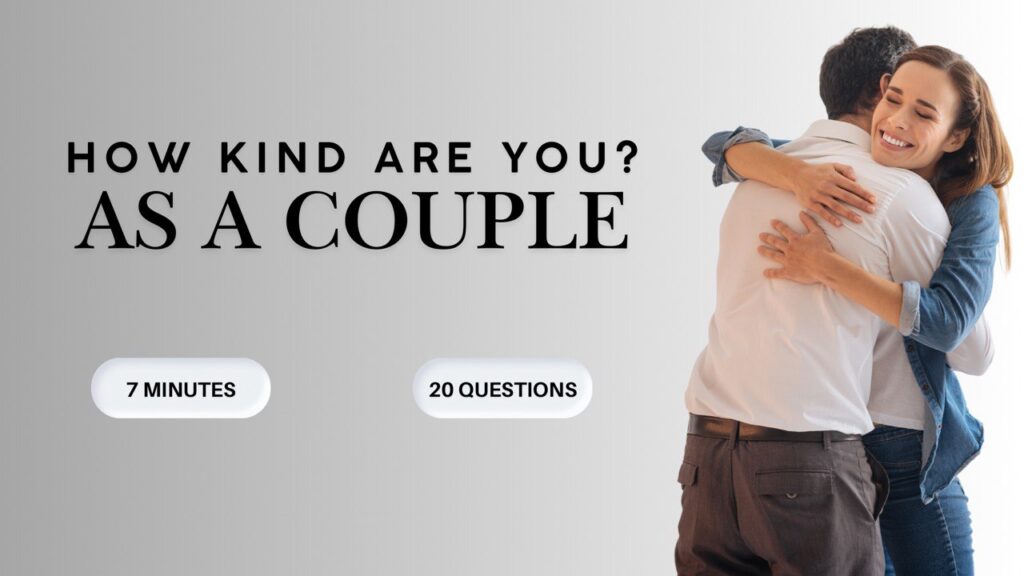
Results
Consistently Kind and Compassionate
- What This Means: You prioritize kindness in all your interactions. Empathy and compassion are central to how you connect with others.
- Strengths:
- Strong ability to make others feel valued and understood.
- A natural inclination to offer support and encouragement.
- Creating positive and harmonious relationships through your actions.
- Growth Opportunities:
- Reflect on whether excessive kindness leads to personal burnout.
- Ensure your kindness is reciprocated in relationships to maintain balance
Warm and Caring
- What This Means: You often prioritize kindness and empathy, though you balance it with other aspects of your personality.
- Strengths:
- An approachable and considerate demeanor.
- Ability to create meaningful and supportive connections.
- Thoughtful responses to the needs of others.
- Growth Opportunities:
- Reflect on moments when kindness could be extended further.
- Explore ways to ensure your kindness aligns with your personal boundaries.
Kindness in Balance
- What This Means: Your responses suggest a balanced approach to kindness. While you value empathy, you may not prioritize it in every situation.
- Strengths:
- Flexibility in adapting your kindness to different contexts.
- Ability to consider both your needs and those of others.
- Maintaining a balanced perspective on empathy and fairness.
- Growth Opportunities:
- Reflect on whether greater kindness could enrich certain relationships.
- Consider how small acts of kindness could make a bigger impact.
Selective Kindness
- What This Means: Your responses indicate that kindness may not always be a priority, possibly due to a focus on other values like honesty or efficiency.
- Strengths:
- Clarity in setting expectations and maintaining directness.
- Focus on practicality and achieving goals in your interactions.
- Maintaining authenticity in relationships.
- Growth Opportunities:
- Reflect on how acts of kindness could foster deeper connections.
- Explore ways to incorporate more empathy without compromising other values.
Pragmatic and Reserved
- What This Means: Kindness may not be a dominant trait in your interactions. You might prioritize practicality or personal boundaries instead.
- Strengths:
- Strong focus on personal independence and resilience.
- Ability to stay firm in situations where kindness could be taken for granted.
- Avoidance of overextending yourself emotionally.
- Growth Opportunities:
- Reflect on whether a lack of kindness limits emotional intimacy.
- Consider how small gestures of kindness could positively impact your relationships and environment.
#1. I try to make my actions benefit the greater good of all, not just myself.
#2. I feel empathy for other people’s misfortune, even if I don’t know them personally.
#3. I try to understand where other people are coming from before reacting to their behavior.
#4. I believe every person has their own travails, even if they’re not obvious to the outside world.
#5. I do the “right thing” even if no one is watching.
#6. I make an effort to include people who may feel left out of social situations.
#7. I think most people would stab me in the back if it helped them get ahead.
#8. I feel committed to a cause greater than myself.
#9. I volunteer my time in my community regularly.
#10. I enjoy complimenting people, even if I will never interact with them again.
#11. I respect other people’s boundaries.
#12. I say “thank you” to service workers, like waiters or delivery people.
#13. I value my close relationships above much else in life.
#14. I like giving gifts.
#15. I do my best not to waste others’ time.
#16. If someone disagrees with me, I struggle to give them the benefit of the doubt.
#17. I would never take credit for other people’s accomplishments.
#18. I thank those who have helped me through life.
#19. I will help someone in need even if it is inconvenient for me.
#20. I forgive and forget.
Previous
Finish


